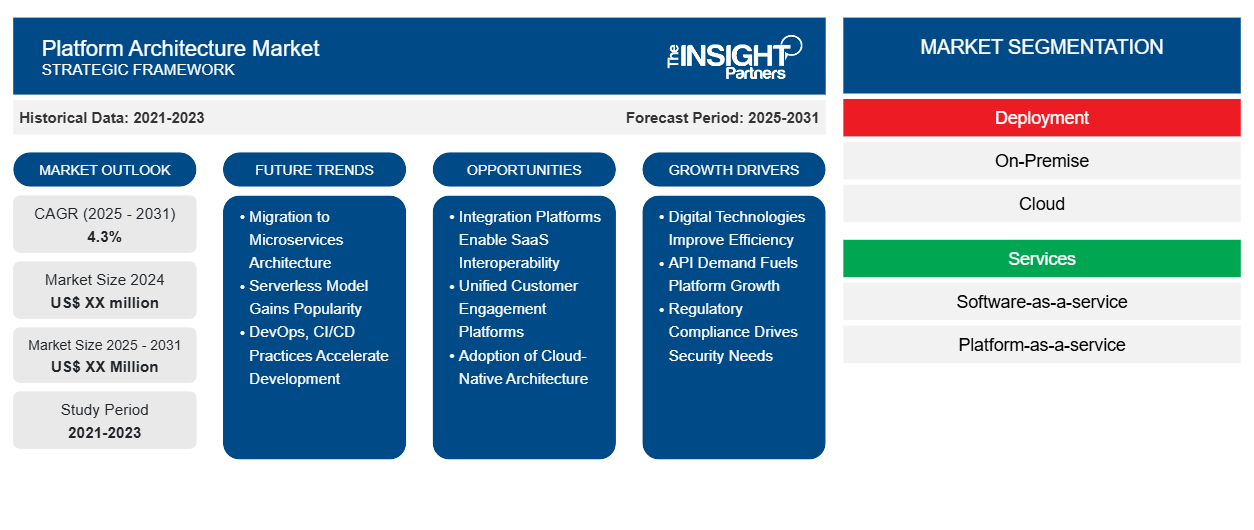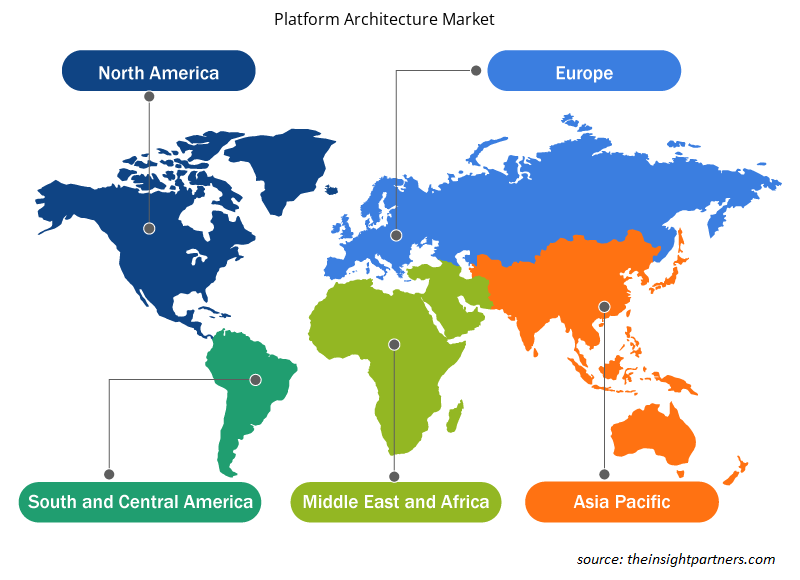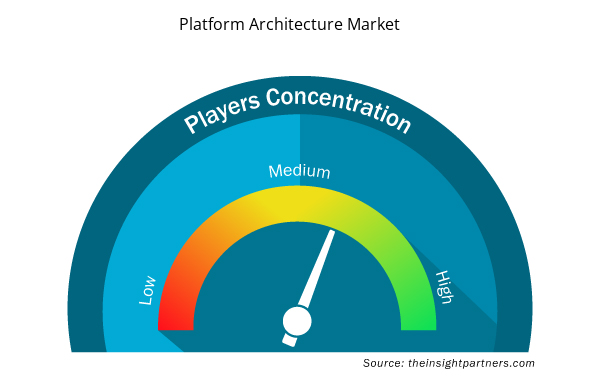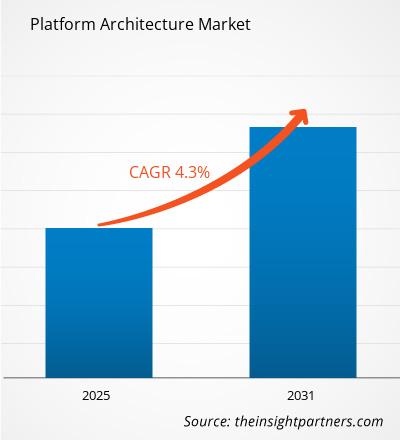The Platform Architecture Market is expected to register a CAGR of 4.3% from 2025 to 2031, with a market size expanding from US$ XX million in 2024 to US$ XX Million by 2031.
The Platform Architecture Market report covers analysis by Deployment, Services, End-user, and Geography. The global analysis is further broken-down at the regional level and major countries.
Purpose of the Report
The report Platform Architecture Market by The Insight Partners aims to describe the present landscape and future growth, top driving factors, challenges, and opportunities. This will provide insights to various business stakeholders, such as:
- Technology Providers/Manufacturers: To understand the evolving market dynamics and know the potential growth opportunities, enabling them to make informed strategic decisions.
- Investors: To conduct a comprehensive trend analysis regarding the market growth rate, market financial projections, and opportunities that exist across the value chain.
- Regulatory bodies: To regulate policies and police activities in the market with the aim of minimizing abuse, preserving investor trust and confidence, and upholding the integrity and stability of the market.
Platform Architecture Market Segmentation
Deployment
- On-Premise
- Cloud
Services
- Software-as-a-service
- Platform-as-a-service
End-user
- BFSI
- Government
- IT and Telecom
- Manufacturing
- Retail
- Others
Geography
- North America
- Europe
- Asia-Pacific
- South and Central America
- Middle East and Africa
Customize This Report To Suit Your Requirement
You will get customization on any report - free of charge - including parts of this report, or country-level analysis, Excel Data pack, as well as avail great offers and discounts for start-ups & universities
Platform Architecture Market: Strategic Insights

- Get Top Key Market Trends of this report.This FREE sample will include data analysis, ranging from market trends to estimates and forecasts.
Platform Architecture Market Growth Drivers
- Digital Technologies Improve Efficiency: Many businesses are using digital technologies to improve efficiency and the user experience. Platform architecture connects several digital solutions so they interact more effectively. Because data can be better exchanged and operational agility is improved, many organizations are turning to platform architectures to do more business at lower costs and faster, accelerating their time-to-market for new products and services. Thus, the demand for robust platform architecture is driven by an organization’s need to streamline processes, make better decisions, and co-develop new solutions.
- API Demand Fuels Platform Growth: The growing demand for Application Programming Interfaces (API) is fuelling this trend as more companies strive to make their applications and services interoperable, or to integrate both from outside sources more effectively via APIs (which is all an API is - an interface between one application and another so they can communicate with one another better, thus, delivering far better user experience and operations efficiency). Plus, as companies gravitate towards adopting microservices architecture and agile development methodologies, they also need far more sophisticated API management policies and systems. As a result, platform architecture is getting more proliferated as more companies are using APIs to build their products and solutions in a scalable way.
- Regulatory Compliance Drives Security Needs: The regulations become stringent with each upcoming legislative bill. So, new-age businesses are building their platform architectures so that they are compliant with the security requirements and regulations in the market. This calls for investing more in the security capabilities of the platform architectures such as robust security mechanisms, identity management, access management, and data governance. With stringent regulatory requirements coming up in the markets, channel customers to establish stringent security postures and meet the compliance requirements. With the evolving regulatory landscape, businesses will increasingly need platform offerings to enhance their security posture and aid in compliance, with implications for the growth of the market.
Platform Architecture Market Future Trends
- Migration to Microservices Architecture: Corporations are migrating to microservices architecture away from monolithic systems: it helps them to scale efficiently and independently, it can improve flexibility and speed, and it does not require teams to always go through a central command to deploy or scale; instead, they can do it themselves. Thus they benefit from more efficient use of resources, integration of different technologies, and the ability to support continuous innovation in today’s competitive digital environment. In other words, as cloud-native technologies mature, microservices will become the norm for modern applications.
- Serverless Model Gains Popularity: The up-and-coming serverless model, in which coders write their apps without managing servers, is already catching on. Scaling applications automatically, based on load, leads to better utilization of resources than physical or virtual managed servers and can translate into improved cost efficiency. Indeed, firms of all sizes have recently shifted serverless workloads, such as analytics enterprise databases, or entire event-driven applications to benefit from faster cycle times and to reduce traditional infrastructure management overhead. We expect to see this trend accelerate as cloud service providers enhance their serverless portfolios while offering more help for businesses in migrating workloads to this model. Overall, this serverless trend will improve the speed and resource utilization for experimentation and development throughout the enterprise stack
- DevOps, CI/CD Practices Accelerate Development: DevOps has emerged as an umbrella term to reflect the change in platform architecture that stems from combining the Continuous Integration/Continuous Deployment (CI/CD) practices with the widespread adoption of Agile development methodology, minimizing conflicts, and hand-offs between developers and operators.
When testing and deployment are automated, it makes it less likely that errors will slip through from one stage to the other, resulting in better-quality software, faster. The more companies adopt Agile methodology, the more we may see DevOps and CI/CD practices coming to the fore, enhancing the velocity of feature delivery to customers.
Platform Architecture Market Opportunities
- Integration Platforms Enable SaaS Interoperability: The customers, with more and more SaaS applications, need middleware or integration platforms to allow the data to communicate fluidly across different applications. Businesses don’t need to develop more applications or services, just smooth data exchange and interoperability between different SaaS applications.
- Unified Customer Engagement Platforms: Growing demand for unified customer engagement, especially from businesses that have gone digital but want to improve or differentiate their customer and end-user experience, is creating opportunities for vendors of digital experience platforms, which offer architectures that combine business content management, analytics, web and mobile user experiences, and points of engagement.
- Adoption of Cloud-Native Architecture: One of the most important opportunities in the market of platform architecture is cloud-native architecture. The shift of most businesses to the cloud, which offers greater scalability and flexibility at lower costs, is leading to increasing demand for optimized platform architectures for cloud environments. Cloud-native platforms, constructed on microservices, containers, and APIs, allow companies to develop applications and services faster and more cost-effectively than is possible with traditional monolithic architecture. The key drivers behind this shift are agility in development and deployment, as well as resource scaling on demand. From the perspective of providers of platform architecture, this trend creates a tremendous opportunity to provide solutions that assist businesses in their digital transformation. A further advantage that cloud-native platforms provide is a more dependable environment, including better disaster recovery, automatic scaling, and greater performance monitoring. As such, an uptrend will remain consistent with enterprise moves toward adopting digital-first strategies, demanding the implementation of cloud-native platform architecture solutions, offering new doors to innovation and market growth.
Platform Architecture Market Regional Insights
The regional trends and factors influencing the Platform Architecture Market throughout the forecast period have been thoroughly explained by the analysts at Insight Partners. This section also discusses Platform Architecture Market segments and geography across North America, Europe, Asia Pacific, Middle East and Africa, and South and Central America.

- Get the Regional Specific Data for Platform Architecture Market
Platform Architecture Market Report Scope
| Report Attribute | Details |
|---|---|
| Market size in 2024 | US$ XX million |
| Market Size by 2031 | US$ XX Million |
| Global CAGR (2025 - 2031) | 4.3% |
| Historical Data | 2021-2023 |
| Forecast period | 2025-2031 |
| Segments Covered |
By Deployment
|
| Regions and Countries Covered | North America
|
| Market leaders and key company profiles |
Platform Architecture Market Players Density: Understanding Its Impact on Business Dynamics
The Platform Architecture Market market is growing rapidly, driven by increasing end-user demand due to factors such as evolving consumer preferences, technological advancements, and greater awareness of the product's benefits. As demand rises, businesses are expanding their offerings, innovating to meet consumer needs, and capitalizing on emerging trends, which further fuels market growth.
Market players density refers to the distribution of firms or companies operating within a particular market or industry. It indicates how many competitors (market players) are present in a given market space relative to its size or total market value.
Major Companies operating in the Platform Architecture Market are:
- Apprenda Inc.
- Amazon Web Services
- Cisco Systems, Inc.
- Google LLC
- IBM Corp.
Disclaimer: The companies listed above are not ranked in any particular order.

- Get the Platform Architecture Market top key players overview
Key Selling Points
- Comprehensive Coverage: The report comprehensively covers the analysis of products, services, types, and end users of the Platform Architecture Market, providing a holistic landscape.
- Expert Analysis: The report is compiled based on the in-depth understanding of industry experts and analysts.
- Up-to-date Information: The report assures business relevance due to its coverage of recent information and data trends.
- Customization Options: This report can be customized to cater to specific client requirements and suit the business strategies aptly.
The research report on the Platform Architecture Market can, therefore, help spearhead the trail of decoding and understanding the industry scenario and growth prospects. Although there can be a few valid concerns, the overall benefits of this report tend to outweigh the disadvantages.
- Historical Analysis (2 Years), Base Year, Forecast (7 Years) with CAGR
- PEST and SWOT Analysis
- Market Size Value / Volume - Global, Regional, Country
- Industry and Competitive Landscape
- Excel Dataset


- Artificial Intelligence in Defense Market
- Virtual Production Market
- Molecular Diagnostics Market
- Extracellular Matrix Market
- Transdermal Drug Delivery System Market
- 3D Audio Market
- Energy Recovery Ventilator Market
- Vaginal Specula Market
- Portable Power Station Market
- Lyophilization Services for Biopharmaceuticals Market

Report Coverage
Revenue forecast, Company Analysis, Industry landscape, Growth factors, and Trends

Segment Covered
This text is related
to segments covered.

Regional Scope
North America, Europe, Asia Pacific, Middle East & Africa, South & Central America

Country Scope
This text is related
to country scope.
Frequently Asked Questions
Some of the customization options available based on request are additional 3-5 company profiles and country-specific analysis of 3-5 countries of your choice. Customizations are to be requested/discussed before making final order confirmation, as our team would review the same and check the feasibility.
The report can be delivered in PDF/PPT format; we can also share excel dataset based on the request.
Key companies of this market are: Axxon Soft, CNL Software, Genetec Inc, Intergraph Corporation Hexagon AB, Milestone systems A S, Prysm Software, Qognify, Tyco International Plc Johnson Controls, Verint Systems Inc.
The Platform Architecture Market is expected to register a CAGR of 4.3% from 2023-2031.
Key future trends in this market are - Centralized security management systems, Integration with IoT devices, AI-driven threat detection
The major factors impacting the Platform Architecture Market are: Regulatory Compliance and Security, Digital Transformation, and Increased Demand for APIs
Trends and growth analysis reports related to Technology, Media and Telecommunications : READ MORE..
1. Apprenda Inc.
2. Amazon Web Services
3. Cisco Systems, Inc.
4. Google LLC
5. IBM Corp.
6. Microsoft Corp.
7. Oracle Corporation
8. RNF technologies
9. SAP SE
10. Synopsys Inc.

 Get Free Sample For
Get Free Sample For